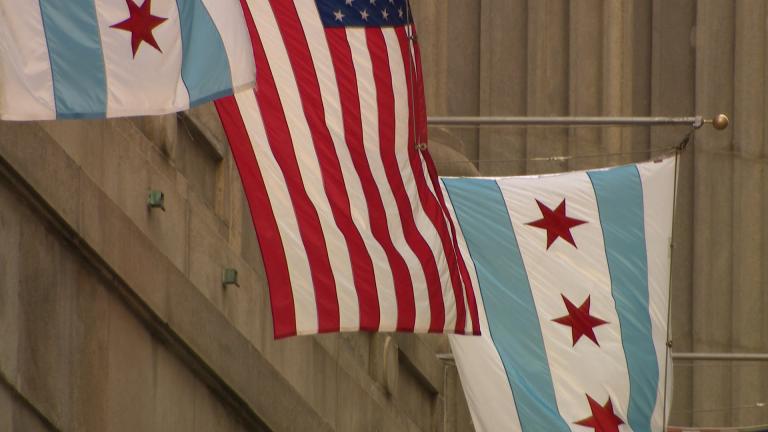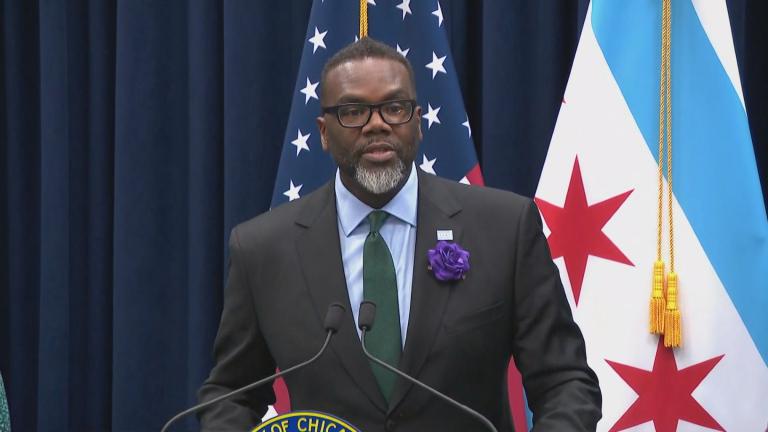 (WTTW News)
(WTTW News)
A key committee once again recommended that the Chicago City Council follow a recommendation from its lawyers and pay $2 million to the family of a man who was shot and killed by a Chicago police officer after a foot chase in August 2014.
The vote on Monday by the City Council’s Finance Committee, which came over the objections of at least seven alderpeople, means the full City Council will once again consider resolving the lawsuit filed by Darius Cole-Garrit’s family, which claims the officers who shot the 21-year-old threatened him hours before they nearly ran him over and then shot him in the back as he fled. That vote is scheduled for Wednesday.
Five months ago, alderpeople voted 22-26 against the settlement in a rare, if not unprecedented, decision by the City Council to reject a proposed settlement after it was endorsed by the City Council’s Finance Committee, mayor and top lawyers.
Two officers fired 16 shots at Cole-Garrit at 9:30 p.m. on Aug. 19, 2014, after a brief foot chase near 133rd Street and Forrestville Avenue. Cole-Garrit was struck nine times, records show.
Ald. Pat Dowell (3rd Ward), the chair of the Finance Committee, urged her colleagues to resolve the case in an effort to save Chicago taxpayers money.
“This is not a black and white kind of case,” Dowell said.
Filed in 2016, the lawsuit that asked a jury to award Cole-Garrit’s family $30 million withstood several attempts by city lawyers to dismiss it, according to court records. It then languished during the shutdown of the federal civil court system at the height of the COVID-19 pandemic.
The proposed settlement included more than $800,000 in fees for the lawyers who represented Cole-Garrit’s family, court records show.
An Altgeld Gardens native, Cole-Garrit lived in Minnesota and was working in a factory at the time of his death, according to the lawsuit. He was shot and killed while visiting Chicago to attend a neighborhood picnic, the lawsuit said.
The lawsuit filed by Cole-Garrit’s family claims the officers who shot him threatened him hours before they nearly ran him over and then shot him in the back as he fled.
Cole-Garrit called his girlfriend after the initial confrontation with the officers on a basketball court at Golden Gate Park and told her he was scared of the officers, who he said told him, “we got your ass, we are going to get you,” according to the lawsuit.
The shooting was a targeted assassination, according to the lawsuit.
Matthew Amarin, the lawyer for Cole-Garrit’s mother as well as the mothers of his two children, urged the City Council to give the victim’s family “the closure they have fought for and deserve.”
Those allegations received little attention when the Finance Committee and the City Council first considered the city’s lawyers’ recommendation to settle the case, but were the subject of several questions from alderpeople on Monday about whether a jury could determine that the officers involved acted maliciously, and award Cole-Garrit’s family punitive damages.
Even though the City Council’s Finance Committee voted 10-9 to endorse the settlement on July 17, the tide turned decisively against ratifying it on July 19 when Ald. Bill Conway (34th Ward) invoked his time as a former assistant state’s attorney who prosecuted officers for misconduct and urged its rejection.
Conway told the full City Council that Cole-Garrit’s autopsy showed that eight of the nine gunshots he suffered were to the front of his body, contradicting the lawsuit’s claim that officers shot him in the back. Conway said that evidence showed the officers faced a “grave and imminent” threat from Cole-Garrit because a semiautomatic weapon had been recovered near his body.
Conway presented a “one-sided” account of Cole-Garrit’s death, noting that the gun was recovered more than 20 feet away from his body, and neither his fingerprints nor his DNA were found on the weapon, Amarin has said.
Conway did not renew those arguments during Monday’s Finance Committee meeting, instead asking city lawyers to identify that the gun found near Cole-Garritt’s body was a semiautomatic pistol and that no fingerprints were recovered from it.
Cole-Garrit’s autopsy will show the gunshots he suffered to the front of his body entered at a “downward angle,” indicating that Cole-Garrit was falling while he was hit, Amarin has said.
The officers said when they approached Cole-Garrit in an unmarked SUV he turned toward them, pulled out a gun and pointed it at them from a “tactical stance,” before ditching his bicycle and fleeing.
Officers Matthew O’Brien and James Bansley chased Cole-Garrit on foot, records show. O’Brien told investigators he opened fire after Cole-Garrit turned and pointed his gun at Bansley.
However, Bansley told investigators that he did not see Cole-Garrit point a gun at him, and a third officer told investigators he believed Cole-Garrit pointed his gun at O’Brien.
O’Brien fired 11 shots, while Bansley fired five times, records show.
The shooting took place before officers were required to wear body-worn cameras, and before the Chicago Police Department had a policy that governed when officers were allowed to chase those suspected of committing a crime.
The shooting was reviewed by the Independent Police Review Authority, which was replaced by the Civilian Office of Police Accountability in 2017 and deemed justified.
O’Brien has faced 57 complaints in his 21-year career, according to a database compiled by the Invisible Institute. None were sustained, according to the database. He has also used force against Chicagoans 45 times in his career, is now a sergeant and earns $129,666 annually, according to the city’s salary database.
O’Brien has faced more complaints and used force more times than 99.4% of all Chicago police officers, according to the database compiled by the Invisible Institute.
Bansley has faced at least nine complaints in his 14-year career, according to the Invisible Institute database.
Contact Heather Cherone: @HeatherCherone | (773) 569-1863 | [email protected]








